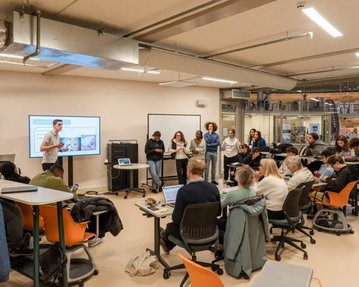
In this blog we will focus on ChatGPT, an AI-powered language model, as well as other tools and how they can be utilized to enhance the learning experience of students.
In this blog we will focus on ChatGPT, an AI-powered language model, as well as other tools and how they can be utilized to enhance the learning experience of students.

Artificial Intelligence (AI) has been making significant changes to various industries, including education. In this article, we will explore the impact of AI in the classroom and how school boards and teachers can make the most of its opportunities while avoiding its downsides.
AI in education involves the use of various technologies, including natural language processing, machine learning, and data analytics, to improve the learning experience of students. AI can assist with a wide range of tasks, from grading assignments to personalized learning programs. It can also provide support to teachers by automating time-consuming tasks such as marking tests, giving them more time to focus on teaching.
ChatGPT is an AI-powered language model that can generate human-like responses to text prompts. It is one of the most advanced language models available and has the potential to revolutionize the way students learn. ChatGPT can be used to develop chatbots that can assist students with their queries and provide personalized support. It can also be used to automate the grading of assignments, allowing teachers to focus on more meaningful aspects of teaching, such as providing feedback and guidance.

One of the most significant benefits of ChatGPT is its ability to provide personalized learning experiences to students. By analyzing students’ responses to prompts, ChatGPT can provide tailored learning experiences that cater to their individual needs. For example, ChatGPT can be used to develop customized learning plans for students based on their progress and learning preferences.

Haarlem Campus offers hybrid lessons, which means that students can follow classes online if they cannot come to class. This is an excellent example of how the school is adapting to the times and embracing technology to reduce its environmental impact.
By allowing students to attend classes remotely, the school can reduce the need for students to commute to the school, which reduces greenhouse gas emissions. Additionally, hybrid lessons offer flexibility to students who may have other commitments or who prefer to learn from home.
Chatbots are becoming increasingly popular in various industries, including education. With ChatGPT, chatbots can be developed to provide personalized support to students. Chatbots can assist students with their queries, provide guidance on assignments, and even assist with test preparation.
School boards and teachers can make the most of AI in the classroom by developing effective strategies that prioritize the learning experience of students. Here are some strategies that school boards and teachers can consider:
Collaborating with AI developers
Collaborating with AI developers can help school boards and teachers to develop effective AI-powered solutions that cater to the specific needs of their students. AI developers can provide insights into the latest AI technologies and assist with the development of customized solutions that cater to the unique needs of schools and their students.
Emphasize ethical AI use
AI has the potential to revolutionize education, but it is crucial to ensure that its use is ethical. School boards and teachers must emphasize the ethical use of AI and ensure that it is used in a way that benefits students without violating their rights or privacy.
Encourage AI literacy
To make the most of AI in the classroom, students must be familiar with its applications and how it works. School boards and teachers can encourage AI literacy by incorporating AI-related subjects into the curriculum and providing students with opportunities to engage with AI technologies.
AI is rapidly changing the landscape of education, providing new opportunities and challenges for teachers, students, and schools. By embracing the potential of AI, schools, and teachers can provide more personalized, data-driven, and effective learning experiences for students. However, it is important to approach AI with caution and to carefully consider the ethical and social implications of using AI in education. With careful planning and implementation, AI has the potential to revolutionize education and improve student outcomes.
We are here for you! Use this number to text us 24/7, and we will do our best to answer quickly!